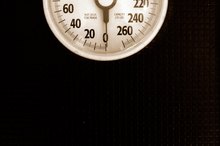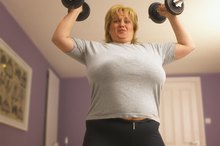Do You Lose Pounds or Inches First?
It is difficult to say whether you will lose pounds or inches first when you go on a weight-loss plan. Initially, you may see more weight loss as your body sheds water weight, suggests the MayoClinic.com website. But if you're working out and building lean mass, the scale may not budge much despite changes in your measurements. Following a healthy diet and workout plan to ensure positive results and long-term benefits that build a healthier body.
Body Composition
When considering your weight-loss and fitness goals, think in terms of body composition – that is your ratio of fat to muscle – rather than simple weight loss. A higher amount of lean tissue means a lower risk of health problems like diabetes and heart disease. Plus, increased lean muscle tissue raises your metabolism, which helps you lose weight and maintain that weight loss. Focus on your overall fitness and well-being, rather than getting hung up on the scale or measuring tape.
- When considering your weight-loss and fitness goals, think in terms of body composition – that is your ratio of fat to muscle – rather than simple weight loss.
- Plus, increased lean muscle tissue raises your metabolism, which helps you lose weight and maintain that weight loss.
Fat Vs. Weight
How to Measure Muscle & Bone Mass
Learn More
If you exercise and eat a healthy diet, you expect to lose weight. However, you might find that your weight stays the same, or you might even gain weight. This can be distressing if you want to lose pounds, but muscle is denser – and therefore heavier – than fat. So you can be get fitter and stronger, and lose fat and inches, without losing any weight. Unless you are very overweight, consider whether your goal should be weight loss or fat loss.
- If you exercise and eat a healthy diet, you expect to lose weight.
- So you can be get fitter and stronger, and lose fat and inches, without losing any weight.
Water Weight
When you start a calorie-restricted diet, your body responds quickly by burning off glycogen, which draws water out of your system. Seeing fast results is satisfying, but if you continue on a very restrictive diet, your body may begin burning lean muscle for fuel. This is counterproductive for long-term weight loss because losing muscle lowers your metabolism and makes you more likely to gain and retain bulky fat.
Ideal Body
What Is a Healthy Serving Size of Peanut Butter?
Learn More
Rather than focusing solely on weight, frame your fitness goals in terms of how you would like to look and feel. One key to feeling good about yourself is finding a weight and appearance that you are happy with, and that you can maintain as part of a healthy lifestyle. Bear in mind that a fit, muscular body can weigh more but look better than a skinny frame with little muscle.
Related Articles
References
- Human Body Composition, Volume 918; Steven Heymsfield
- Sports Doctor.com: Think Inches, Not Pounds
- Dump Your Toxic Waist; Derrick Cutting
- Weight Loss -- Twenty Pounds in Ten Weeks -- Move It to Lose It; Joseph Weinstein
- Centers for Disease Control and Prevention. Losing weight. Updated February 4, 2020.
- Swencionis C, Wylie-Rosett J, Lent MR, et al. Weight change, psychological well-being, and vitality in adults participating in a cognitive-behavioral weight loss program. Health Psychol. 2013;32(4):439-46. doi:10.1037/a0029186
- Gardner J, Kjolhaug J, Linde JA, Sevcik S, Lytle LA. Teaching goal-setting for weight-gain prevention in a college population: Insights from the CHOICES study. J Health Educ Teach. 2013;4(1):39-49.
- InformedHealth.org [Internet]. Exercise, weight loss, and osteoarthritis. Institute for Quality and Efficiency in Health Care (IQWiG). Updated July 16, 2014.
- Lasikiewicz N, Myrissa K, Hoyland A, Lawton CL. Psychological benefits of weight loss following behavioural and/or dietary weight loss interventions. A systematic research review. Appetite. 2014;72:123-37. doi:10.1016/j.appet.2013.09.017
- Pietrzykowska NB. Benefits of 5-10 percent weight-loss. Obesity Action Coalition. Updated 2013.
Resources
Writer Bio
Zoe Glass has been writing journalism, essays and fiction since 2001. Her articles have been featured in publications including literary journals "Beatdom" and "Denali," the music magazine "Mixmag" and the London newspaper "Snipe." Glass holds a Bachelor of Arts in English from the University of Pennsylvania and is studying for a Master of Letters in writing at the University of Glasgow.









